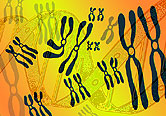 |
 |
 |

Gene Variant Tied to Smokers' Risk of Lung Cancer
2 transporters normally help protect lungs by removing inhaled toxins, study say|
|
HealthDay
By Kevin McKeever
Monday, December 22, 2008
 MONDAY, Dec. 22 (HealthDay News) -- People may face an increased risk of lung cancer if they have a gene variant that metabolizes the most potent of cigarette smoke carcinogens, a new study says.
MONDAY, Dec. 22 (HealthDay News) -- People may face an increased risk of lung cancer if they have a gene variant that metabolizes the most potent of cigarette smoke carcinogens, a new study says.
The ABCB1 and ABCC1 genes normally help protect the lungs by removing inhaled toxins. Specifically, they act on tobacco-specific nitrosamine 4-(methylnitrosamino)-1-(3-pyridyl)-1-butanone (NNK) -- a cigarette smoke component shown to cause lung cancer in rodents.
Researchers at Fudan University in Shanghai, China, recently identified common variants in the ABCB1 and ABCC1 genes (ABCB1 rs3842 or ABCC1 rs212090) tied to people with lung cancer that might indicate a person's increased risk of developing the disease. In particular, women and people under age 60 with ABCB1 rs3842 showed an increased risk of cancer. The variant was also linked to adenocarcinoma, a major type of lung cancer.
"Because tobacco smoking is the leading preventable cause of cancer and the cancer-prone genotypes of these genetic components are relatively prevalent in the human population, our findings have important implications for the prevention of tobacco smoking-related cancers," the study authors wrote.
The findings were published online Dec. 22 in Cancer and will appear in the Feb. 1, 2009, print issue of the journal.
HealthDay
Copyright (c) 2008 ScoutNews, LLC. All rights reserved.
Related News:
More News on this Date
Related MedlinePlus Pages:
| Home | Health Topics | Drugs & Supplements | Encyclopedia | Dictionary | News | Directories | Other Resources | |
| Disclaimers | Copyright | Privacy | Accessibility | Quality Guidelines U.S. National Library of Medicine, 8600 Rockville Pike, Bethesda, MD 20894 National Institutes of Health | Department of Health & Human Services |
Date last updated: 23 December 2008 |




